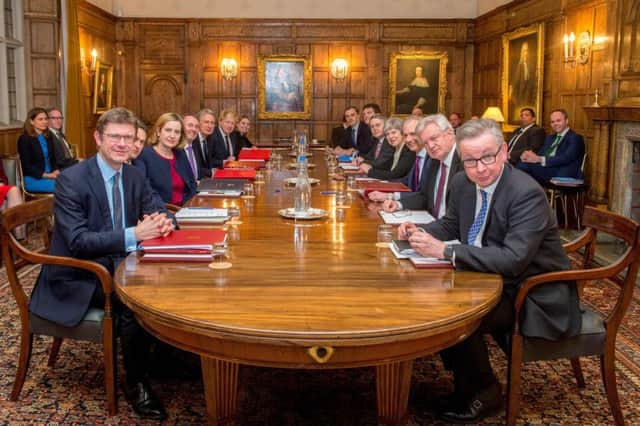Cabinet bid for Brexit unity bid runs into trouble


The Cabinet away-day on Thursday settled on a position of “ambitious managed divergence” from the EU, withdrawing from formal regulatory mechanisms while sticking close to Brussels rules in key areas to maintain trade.
Mrs May will set out her position on the future relationship with the EU in a speech next Friday.
Advertisement
Hide AdAdvertisement
Hide AdHowever, pro-EU MPs from her own party insisted the UK had to remain in the European customs union, while Brexit supporters voiced anger at reports that the government was prepared to compromise on residency rights for European nationals who arrive in Britain after Brexit day.
Mrs May could set out her Brexit vision at the Scottish Conservative party conference in Aberdeen on 2-3 March, although Downing Street has not confirmed the venue for the speech.
Her official spokesman characterised the eight-hour Chequers meeting as “very positive … and a step forward, agreeing the basis of the Prime Minister’s speech on our future relationship”.
But First Minister Nicola Sturgeon said it “beggars belief” that Scottish Secretary David Mundell was not at Chequers to take part in “decisions with massive implications for Scotland’s future”.
Speaking to the BBC, Mr Mundell said the conclusions of the Brexit sub-committee would be discussed and signed off at a meeting of the full Cabinet on Tuesday.
Tory Brexit rebels, led by the MP Anna Soubry, said they would back an amendment to the Trade Bill that mandates the UK to form a customs union with Brussels on leaving the EU.
Meanwhile, Labour leader Jeremy Corbyn is widely predicted to give his blessing to a customs union arrangement with the EU in a speech on Monday, in which he is expected to give greater clarity on his party’s Brexit policy.
Shadow foreign secretary Emily Thornberry said Labour now backs a customs union which would look “pretty much like” the current one after withdrawal.
Advertisement
Hide AdAdvertisement
Hide AdDowning Street denied it was extending full residency rights to EU nationals who arrive during the two-year post-Brexit transition period, after Jacob Rees-Mogg, who chairs the European Research Group of backbench Tory Eurosceptics, said it would be “unconscionable” for Mrs May to cave in to Brussels demands.